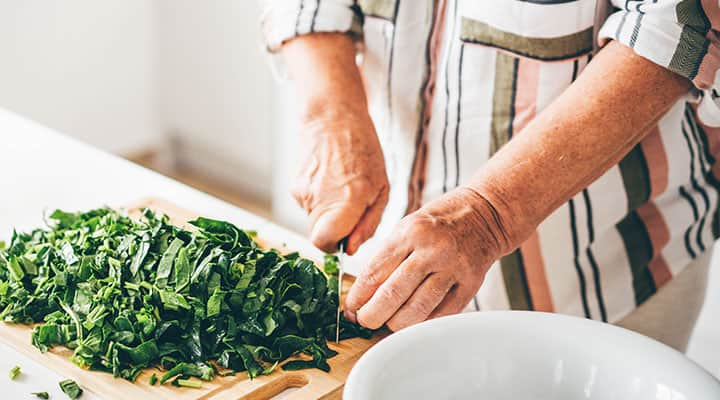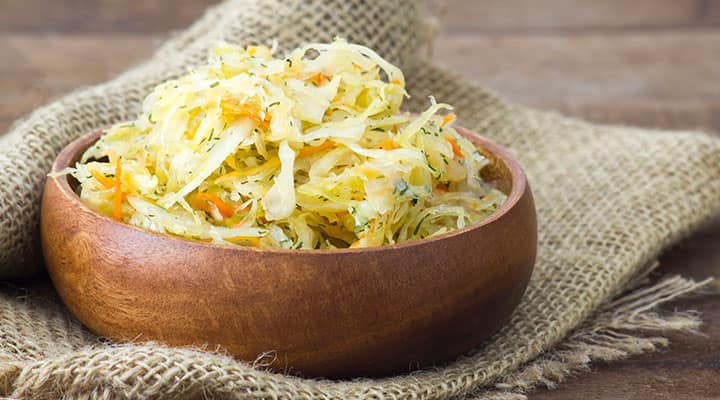
More Vitamin K Keeps Broken Bones Away
More Vitamin K Keeps Broken Bones Away
Ask any older woman what she fears most about her golden years, and breaking a hip is likely at the top of her list. That's because later in life, a hip fracture can mean the difference between independence and having to move into assisted living or even being bedbound.
But there is good news for anyone hoping to keep their bones unbroken as they age: Getting enough vitamin K (specifically, vitamin K1, which is found in dark leafy green vegetables) has been linked with a much lower bone fracture risk. This encouraging research came out of an Australian study, which followed nearly 1,400 older women over a period of nearly 15 years. It found an "ideal" vitamin K intake of 100 mcg per day.
Does vitamin K make bones stronger?
As the observational study out of Edith Cowan University's Nutrition and Health Innovation Research Institute showed, there is a correlation between higher vitamin K intake and lower fracture risk.
Researchers assessed participants' dietary intake of vitamin K1 at the start of the study using a food frequency questionnaire. Then over the next 14.5 years, researchers noted any fracture-related hospitalizations.
They found that compared with the women in the lowest quartile of vitamin K1 intake, the women in the highest quartile had a significantly lower risk of fracture-related hospitalization—specifically, 31% lower risk of any fracture-related hospitalization and 49% lower risk of a hip-fracture-related hospitalization.
The study reinforces previous research, which has shown that vitamin K is essential for bone health and bone density, and which associates vitamin K deficiency with bone fractures. It also shows the importance of vitamin K intake for postmenopausal women who are concerned with their risk of osteopenia or osteoporosis.
Vitamin K isn't the only vitamin linked to bone mineral density. Vitamin D is also involved in maintaining a good calcium balance and is considered important to overall bone health. Together, vitamin K and vitamin D work in the body to help calcium go into bones and not into the arteries.
5 best sources of vitamin K
Luckily for us, vitamin K is readily available in our diet. In general, plant sources provide vitamin K1, and fermented foods, meat and dairy provide vitamin K2, but there are exceptions. In particular, sauerkraut is a good food source of both vitamin K1 and vitamin K2.
Food sources of vitamin K1
- Leafy green vegetables such as collards, turnip, kale and spinach
- Cruciferous vegetables like broccoli, cabbage and Brussels sprouts
- Asparagus
- Kiwi and some other fruits, such as blueberries and grapes. (But most fruits do not contain significant amounts of vitamin K.)
- Avocado
Food sources of vitamin K2
- Natto, a fermented soy food
- Certain cheeses
- Sauerkraut
- Meats like chicken, beef and pork (depending on their origin)
- Fish
Vitamin K formulas are another way to get the vitamin K intake you need to support bone mineral density and protect against bone loss.
Which vitamin K is best for bone health?
Vitamin K1 and vitamin K2 are both important for bone mineral density. They support cardiovascular and brain health as well. Vitamin K1 is well-known for its role in blood clotting (which is why health experts recommend that all newborns get a dose of vitamin K.) Vitamin K2 appears to be more involved in other aspects of cellular health.
But the data is conflicting in controlled trials when it comes to comparing the various forms of vitamin K. Some studies show vitamin K1 is associated with lower risk of fracture but K2 is not. Others show that various forms of vitamin K2—such as menaquinone-4 (MK-4) and menaquinone-7 (MK-7)—do show promise in supporting bone health, especially in postmenopausal women. Similarly, some studies show vitamin K2 is associated with cardiovascular health but vitamin K1 is not.
The best bet for someone wanting to safeguard their bone health and cardiovascular health as they age would be to get a variety of vitamin K forms through both diet and non-food vitamin K sources.
How much vitamin K should I get daily?
Many experts recommend vitamin K intake far above the RDA of 90-120 mcg, which is intended to avoid a vitamin K deficiency, but which doesn't optimize vitamin K's health benefits. The best formulas offer a blend of vitamin K1 and vitamin K2 to deliver optimal bone health and cardiovascular health benefits. Life Extension recommends a daily intake of 1,500 mcg of vitamin K1, and 1,000 mcg of the MK-4 form of vitamin K2 and 100 mcg of vitamin K2's MK-7.
For postmenopausal women looking for extra bone support (because bone mineral density becomes of particular concern as women age), Life Extension recommends an even higher dose of vitamin K2, up to 45 mg of vitamin K2's MK-4 form, which has been studied clinically for building up bones.
What else can you do to support bone health?
There are a number of ways you can prevent bone loss and promote bone density other than calcium, vitamin D and vitamin K. Bone-related health (like many other aspects of health) is best maintained through a variety of healthy lifestyle choices, including the following:
Exercise.
Resistance exercise and weight-bearing exercise have long been recommended for maintaining bone strength and other aspects of well-being.Limit alcohol.
There are many reasons to avoid excess alcohol ingestion, and here is one more: It can accelerate bone loss. Excess alcohol also leads to hangovers, which will make getting to the gym to exercise that much harder the next day.Avoid nutrient deficiency.
Japanese researchers have concluded that the accumulation of a number of vitamin deficiencies in study subjects was associated with a 25% increased fracture risk.Eat a well-rounded diet.
You may take calcium, vitamin D and K, but other nutrients affect bone density as well. Soy isoflavones, collagen and other micronutrients, like magnesium, zinc and boron, are important for bone health as well. So getting variety on your table can help prevent bone and hip fractures.Consider hormone replacement.
Declining estrogen is a major driver of bone loss and bone resorption, so postmenopausal women may also want to consider hormone replacement therapy.
Should you take vitamin K and calcium together?
In the quest for more bone mineral density and less bone loss, the combination of calcium—a bone health superstar—with vitamin D and vitamin K is essential. Without enough vitamin D and K, the calcium in your body might not be absorbed efficiently into the bone. Instead, it could take up residence in your arteries, contributing to the fatty plaques that narrow arteries.
So your calcium intake should be balanced with the intake of vitamin D and vitamin K to help support bone formation, inhibit bone resorption, and prevent bone fractures.
How can vitamin K benefit you?
Vitamin K, both as vitamin K1 and the MK-4 and MK-7 forms of vitamin K2, is associated with variety of health benefits—not just bone formation and bone mineral density. Controlled trials and meta-analysis research shows evidence for vitamin K's contribution to other aspects of longevity, including the following:
Heart health hero:
Lower risk of coronary heart disease linked to higher intake of vitamin K2. Meanwhile, higher intake of both forms linked to reduced risk of diabetes.Good to the bones:
Lower levels of vitamin K1 is linked to increased risk of fracture.Brilliant for the brain:
Better cognitive function has been linked to higher dietary intake of vitamin K1.Blood health benefits:
Vitamin K is essential for blood clotting and wound healing.
References
- Anagnostis P, et al. "Estrogen and bones after menopause: a reappraisal of data and future perspectives." Hormones (Athens). March 2021. https://pubmed.ncbi.nlm.nih.gov/32519298/
- Geleijnse JM, et al. "Dietary intake of menaquinone is associated with a reduced risk of coronary heart disease: the Rotterdam Study." J Nutr. November 2004. https://pubmed.ncbi.nlm.nih.gov/15514282/
- Goltzman D. "Functions of vitamin D in bone." Histochem Cell Biol. April 2018. https://pubmed.ncbi.nlm.nih.gov/29435763/
- Kemmler W, et al. "Effects of Different Types of Exercise on Bone Mineral Density in Postmenopausal Women: A Systematic Review and Meta-analysis." Calcif Tissue Int. November 2020. https://pubmed.ncbi.nlm.nih.gov/32785775/
- Kuroda T, et al. "Multiple vitamin deficiencies additively increase the risk of incident fractures in Japanese postmenopausal women." Osteoporos Int. March 2019.
- Pawlowski JW, et al. "Impact of equol-producing capacity and soy-isoflavone profiles of supplements on bone calcium retention in postmenopausal women: a randomized crossover trial." Am J Clin Nutr. 2015. https://pubmed.ncbi.nlm.nih.gov/26245807/
- Schwalfenberg GK. "Vitamins K1 and K2: The Emerging Group of Vitamins Required for Human Health." J Nutr Metab. June 2017. https://www.ncbi.nlm.nih.gov/pmc/articles/PMC5494092/
- "Higher vitamin K intake linked to lower bone fracture risk late in life." Edith Cowan University. November 2022. https://www.sciencedaily.com/releases/2022/11/221128101233.htm
About Our Story Sources
The Life Extension Health News team delivers accurate information about vitamins, nutrition and aging. Our stories rely on multiple, authoritative sources and experts. We keep our content accurate and trustworthy, by submitting it to a medical reviewer.


